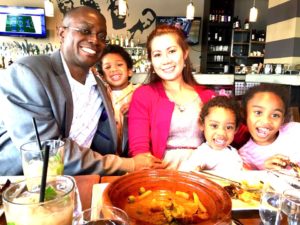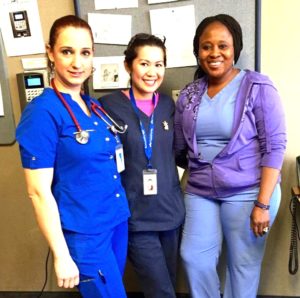Filipina juggles career and raising Fil-Nigerian-American kids

Portrait of a multiracial family: They are not only Americans, Filipinos and Nigerians, but also citizens of the world. CONTRIBUTED
BANGKOK — For most mothers, raising a family and engaging in a career is never easy. It gets even more challenging if you live abroad and are trying to raise a multicultural family.
Yet, for Josie Rabaya Tato Akintide, 40, a working nurse with three kids and a Nigerian-born husband, successfully combining career and motherhood is possible; that is, with the help of an understanding partner or spouse.
Born in Manila Josie, a registered nurse, later immigrated to the United States and was one of the few Filipinos and foreigners who were able to work at Johns Hopkins Hospital, a prestigious institution in Baltimore. Before Johns Hopkins, Josie worked at a hospital in Queens, New York where she was assigned by her petitioning agency. Josie met her future husband, Adedoyin Akintide, a Nigerian-born US citizen who was doing his one-year medical internship.
“It wasn’t my plan to marry a foreigner and a black man at that. My first time in the subway, I was so afraid of the black men because of the stereotype attached to them,” she explains.
Article continues after this advertisementAfter she got used to living in New York, she eventually began estimating people not for their skin color, but for who they are. Thus, when Adedoyin proposed to her, she did not think twice, knowing how gentle, loving and intelligent he is.
Article continues after this advertisement
After her contract at Queens, Josie worked in Johns Hopkins’ orthopedic surgery and neurosurgery units from 2008 until 2011 while her husband went on his residency training at a MedStar hospital in Baltimore. She did not experience any discrimination, she says, because of her qualifications and because Johns Hopkins is a multicultural environment.
The Akintides moved to northern Virginia after her husband finished his nephrology fellowship specialization in New York. In northern Virginia, a “bedroom” suburb of Washington, DC, Adedoyin joined a private practice but eventually set up his own business as an independent consultant. He also formed a physician recruitment agency business with other physician associates.

Josie Tato Akintide with her colleagues at Johns Hopkins Hospital, her former workplace. CONTRIBUTED
Josie now works in a not-for-profit hospice organization called Capital Caring in part time position, which allows her to work flexible shifts. Josie thinks hospice nursing is one of the best areas to work in as a Christian, caring for the most vulnerable patients and their families in their loved one’s last days on the earth. She sees it as a whole different ministry where she can practice nursing and spirituality.
A multicultural family
Nigerians and Filipinos have almost the same cultural tradition when it comes to family, such as supporting extended families. The Akintides have three small children, thus, Josie finds it more convenient to work part time.
“I’m juggling mommy duties with my preschoolers and First Grader. My role as a mom and wife takes priority more than anything else,” she says.
The Akintide children are taught to appreciate both their mother’s Filipino culture and that of the Yoruba tribe of their father.
“Our children learned how to greet in the morning and with the elders in Yoruba language while kneeling down (for girls) and prostrating down (for boys). It’s a similar gesture of ‘pagmamano’ for us Filipinos, which they know how to do as well.
“I think they can speak and understand Filipino more than Yoruba since they get to listen to home conversations with my mom (who is now in the US). And of course, there’s the Filipino Channel,” Josie explains.
Since Adedoyins’s family members are now mostly in the US, their children go to traditional Nigerian social gatherings more. While Josie does not have much to say about their Philippine ancestors, her father-in-law has the most influence because the elder Akinide is a historian and was involved in Nigerian politics. He tells stories to his grandchildren about his life as the Akure tribe’s prince, constantly telling them that they’re from a royal lineage in Nigeria.
Josie’s eldest Aderinsola Jaden has been to the Philippines, but the children have never been to Nigeria. Among her three kids, Aderinsola is the most Filipino-looking while the eldest, Adedara Josette, has the strong physical features of a Nigerian; so does Aderayo Jeremy. The kids have all “Ade” before their names because it means crown, signifying royalty.
“Sometimes, I am people ask if I am their nanny. But I don’t feel any offense in that,” Josie says.
She is enjoying motherhood and raising her kids the way her parents raised her and her siblings, as God-fearing and kind people.
She knows that whether she likes it or not, the children will eventually adopt the American culture; thus she and her husband try to raise them early not only as Americans or Filipinos or Nigerians, but also as “citizens of the world.”